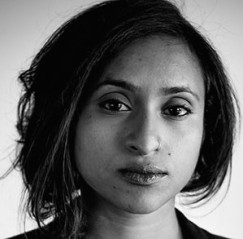In our icebreaker today, we started class by discussing the differences between faith and religion. Can you have faith without having religion? How? In what or whom do we have faith? What are our beliefs and values in relation to forces outside of ourselves?
Agreeing across the board that some kind of faith was universal for us even if organized religion was not, we returned to themes of religion and hatred from last week’s discussion on Orlando. Using lesbian Jamaican-Chinese-American poet Staceyann Chin’s “A City in Tragedy,” we discussed how far our country has and has not come from associating non-Western religions with fear and terrorism.

We opened our reading this week with a free-verse poem called “En Route to Bangladesh, Another Crisis of Faith” from the Bangladeshi-American poet Tarfia Faizullah. Although some of us who have our own origins in Bangladesh resented Faizullah’s revulsion for her home country, we also understood the roots of her ambivalence– the crises that displacement can pose to a person’s relationship to her family’s culture and religion. In her poem, we especially highlighted enjambment, her tendency to wrench lines out of sync in discomfiting ways. We also discussed her decision to end her poem with a few lines from the Peruvian poet César Vallejo‘s “Nostalgias imperiales I.“

Tobagonian–Canadian poet M. NourbeSe Philip‘s interrelated pair of poems from she tries her tongue; her silence softly breaks (republished 2014), “The Catechist” and “Eucharistic Contradictions,” caused far more disorientation than we’d bargained for! It was really difficult to make sense of conceptual poetry, her hyperbolic overuse of alliteration, and the haunting, abstract imagery that linked her colonially inherited Christianity to sexuality and spiritual corruption. Nevertheless, we did our best!
Unfortunately working through her poems left us with little time for the amazing short story, “The Bridge Stories,” from a writer born in the U.S. Virgin Islands, Tiphanie Yanique. A series of interconnected vignettes, “The Bridge Stories” illuminated intersections between

Muslim and Christian identities across the Caribbean’s diverse mix of cultures. Written in the vein of magical realism, or what the Cuban writer Alejo Carpentier coined as lo real maravilloso (“the magical real”), Yanique’s story pushed us to think of the bridge as an embattled metaphor for both the possibilities and the perils of identifying across borders.
Here were the writing prompts for this week, in case you missed the meeting and would like to pick one up at home (or finish something you already started to post to this blog!):
- After Faizullah, write a free-verse poem about a time when you had a crisis in faith. Capture the setting and the cause of your crisis in that memory. Be strategic about enjambment, and consider starting or ending your poem with one of her lines.
- After Philip, write a free-verse poem meditating on your relationship to the faith you grew up with. Is it a relationship of gratitude and respect? Of hostility and skepticism? Of uncertainty and doubt? Convey your feelings through tone and alliteration.
- After Yanique, re-envision the metaphor of the bridge and sketch out two vignettes that reflect on your faith from two divergent points of view. How are these characters related? In what world– real or magical— are they circulating?
Next week: Sexual orientation with a poem from James Baldwin, excerpts from Alison Bechdel‘s graphic memoir, Fun Home, and short stories from Junot Díaz and Ismat Chughtai.